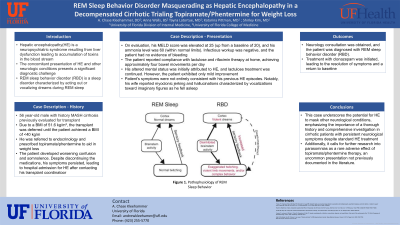Tuesday Poster Session
Category: Liver
P4817 - REM Sleep Behavior Disorder Masquerading as Hepatic Encephalopathy in a Decompensated Cirrhotic Patient Trialing Topiramate/Phentermine for Weight Loss
Tuesday, October 29, 2024
10:30 AM - 4:00 PM ET
Location: Exhibit Hall E

Has Audio
- AK
Andrew C. Kleehammer, DO
University of Florida College of Medicine
Gainesville, FL
Presenting Author(s)
Andrew C. Kleehammer, DO, Anna Walls, BS, Tayna Latortue, MD, Katarina Pittman, MD, Shirley Kim, MD
University of Florida College of Medicine, Gainesville, FL
Introduction: Hepatic encephalopathy (HE) is a neuropsychiatric syndrome resulting from liver dysfunction, leading to the accumulation of toxins in the bloodstream and causing a wide array of neurological symptoms. The concomitant presentation of HE with other neurological conditions presents a significant diagnostic challenge.
Case Description/Methods: We report the case of a 56-year-old male with a history of metabolic dysfunction-associated steatohepatitis (MASH) cirrhosis who was evaluated for a liver transplant. Due to a BMI of 51.6 kg/m², the transplant was deferred until the patient achieved a BMI of < 40 kg/m². He was referred to endocrinology and prescribed topiramate/phentermine to aid in weight loss. Shortly after initiating these medications, the patient developed worsening confusion and somnolence. Despite discontinuing the medications, his symptoms persisted, leading to hospital admission.
On evaluation, his MELD score was elevated at 25 (up from a baseline of 20), and his ammonia level was 60 (within normal limits). Infectious workup was negative, and the patient had no evidence of bleeding. The patient reported compliance with lactulose and rifaximin therapy at home, achieving approximately four bowel movements per day. His altered mental status was initially attributed to HE, and lactulose treatment was continued. However, the patient exhibited only mild improvement.
Further history revealed that the patient's symptoms were not entirely consistent with his previous HE episodes. Notably, his wife reported myoclonic jerking in the lower extremities and hallucinations characterized by vocalizations toward imaginary figures as he fell asleep. Neurology consultation was obtained, and the patient was diagnosed with REM sleep behavior disorder (RBD). Treatment with clonazepam was initiated, leading to the resolution of symptoms and a return to baseline.
Discussion: This case underscores the potential for HE to mask other neurological conditions, emphasizing the importance of a thorough history and comprehensive investigation in cirrhotic patients with persistent neurological symptoms despite standard HE treatment. Additionally, it calls for further research into parasomnias as a rare adverse effect of topiramate/phentermine therapy, an uncommon presentation not previously documented in the literature.
Disclosures:
Andrew C. Kleehammer, DO, Anna Walls, BS, Tayna Latortue, MD, Katarina Pittman, MD, Shirley Kim, MD. P4817 - REM Sleep Behavior Disorder Masquerading as Hepatic Encephalopathy in a Decompensated Cirrhotic Patient Trialing Topiramate/Phentermine for Weight Loss, ACG 2024 Annual Scientific Meeting Abstracts. Philadelphia, PA: American College of Gastroenterology.
University of Florida College of Medicine, Gainesville, FL
Introduction: Hepatic encephalopathy (HE) is a neuropsychiatric syndrome resulting from liver dysfunction, leading to the accumulation of toxins in the bloodstream and causing a wide array of neurological symptoms. The concomitant presentation of HE with other neurological conditions presents a significant diagnostic challenge.
Case Description/Methods: We report the case of a 56-year-old male with a history of metabolic dysfunction-associated steatohepatitis (MASH) cirrhosis who was evaluated for a liver transplant. Due to a BMI of 51.6 kg/m², the transplant was deferred until the patient achieved a BMI of < 40 kg/m². He was referred to endocrinology and prescribed topiramate/phentermine to aid in weight loss. Shortly after initiating these medications, the patient developed worsening confusion and somnolence. Despite discontinuing the medications, his symptoms persisted, leading to hospital admission.
On evaluation, his MELD score was elevated at 25 (up from a baseline of 20), and his ammonia level was 60 (within normal limits). Infectious workup was negative, and the patient had no evidence of bleeding. The patient reported compliance with lactulose and rifaximin therapy at home, achieving approximately four bowel movements per day. His altered mental status was initially attributed to HE, and lactulose treatment was continued. However, the patient exhibited only mild improvement.
Further history revealed that the patient's symptoms were not entirely consistent with his previous HE episodes. Notably, his wife reported myoclonic jerking in the lower extremities and hallucinations characterized by vocalizations toward imaginary figures as he fell asleep. Neurology consultation was obtained, and the patient was diagnosed with REM sleep behavior disorder (RBD). Treatment with clonazepam was initiated, leading to the resolution of symptoms and a return to baseline.
Discussion: This case underscores the potential for HE to mask other neurological conditions, emphasizing the importance of a thorough history and comprehensive investigation in cirrhotic patients with persistent neurological symptoms despite standard HE treatment. Additionally, it calls for further research into parasomnias as a rare adverse effect of topiramate/phentermine therapy, an uncommon presentation not previously documented in the literature.
Disclosures:
Andrew Kleehammer indicated no relevant financial relationships.
Anna Walls indicated no relevant financial relationships.
Tayna Latortue indicated no relevant financial relationships.
Katarina Pittman indicated no relevant financial relationships.
Shirley Kim indicated no relevant financial relationships.
Andrew C. Kleehammer, DO, Anna Walls, BS, Tayna Latortue, MD, Katarina Pittman, MD, Shirley Kim, MD. P4817 - REM Sleep Behavior Disorder Masquerading as Hepatic Encephalopathy in a Decompensated Cirrhotic Patient Trialing Topiramate/Phentermine for Weight Loss, ACG 2024 Annual Scientific Meeting Abstracts. Philadelphia, PA: American College of Gastroenterology.
